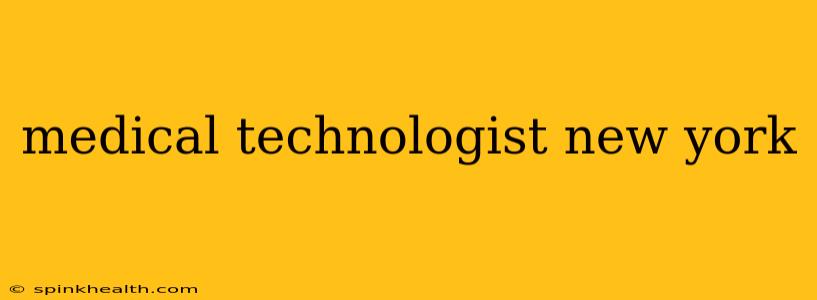A Day in the Life of a Medical Technologist in New York: From Blood Draws to Breakthroughs
The bustling city of New York, a global hub of innovation, is also home to a vast network of medical laboratories, quietly humming with activity. At the heart of this intricate system are the medical technologists – the unsung heroes meticulously analyzing samples and contributing to crucial diagnoses. This isn't just a job; it's a calling, demanding precision, dedication, and a passion for unraveling the mysteries held within a single drop of blood, a tissue sample, or a microscopic organism.
My journey into the world of medical technology began with a fascination for the human body, a curiosity about its intricate mechanisms, and a desire to make a tangible difference in people's lives. New York City, with its diverse population and cutting-edge medical facilities, was the ideal setting to pursue this career.
What Does a Medical Technologist in New York Do?
My typical workday is a dynamic blend of technical skills and analytical thinking. It's not all lab coats and beakers, although those are certainly part of the scene. Let's unpack a typical day:
- Morning Routine: The day often starts with reviewing pending tests and prioritizing them based on urgency. This could range from routine blood work to more complex analyses requiring specialized techniques.
- Sample Processing: This is where the action begins. We receive a constant stream of samples – blood, urine, tissue biopsies – each carrying the potential to reveal vital information about a patient's health. My team and I meticulously process these samples, ensuring accuracy and maintaining strict adherence to protocols.
- Analytical Testing: This is the core of our work. Using sophisticated instruments and techniques, we perform a wide array of tests, from basic hematology and blood chemistry to more specialized analyses involving microbiology, immunology, and molecular diagnostics. Imagine analyzing DNA to help determine the best cancer treatment or conducting a complex blood test for a rare disease.
- Quality Control: Accuracy is paramount. We rigorously follow quality control measures, ensuring the reliability and validity of our results. This involves regular calibrations, maintenance of equipment, and proficiency testing. Every result we report impacts patient care, making meticulousness essential.
- Reporting and Collaboration: Once the analyses are complete, we meticulously document our findings, generating reports that are crucial for physicians in making informed decisions about patient treatment. We often collaborate directly with physicians, discussing findings and offering our expertise.
Becoming a Medical Technologist in New York: Education and Certification
What education do I need to become a medical technologist in New York?
To work as a medical technologist in New York, you'll need a minimum of a bachelor's degree in medical technology, clinical laboratory science, or a closely related field from an accredited institution. This education is rigorous, covering a broad spectrum of laboratory techniques, scientific principles, and clinical correlations. Many programs also require a supervised clinical internship or practicum to gain practical experience. After graduation, you'll typically need to pass a certification exam offered by the American Society for Clinical Pathology (ASCP) or another nationally recognized organization.
How much does a medical technologist make in New York?
Salaries for medical technologists in New York vary depending on experience, location, and employer, but generally fall within a competitive range, reflecting the high demand for qualified professionals in this field. The cost of living in New York City, naturally, is a factor to consider when assessing salary expectations.
What are the job prospects for medical technologists in New York?
The job outlook for medical technologists in New York is generally positive. With the aging population and the continuous advancement of medical technology, the demand for qualified professionals in this field is likely to remain robust. New York's extensive healthcare system necessitates a substantial workforce of skilled medical technologists.
What are the career advancement opportunities for medical technologists?
Career progression for medical technologists often involves assuming roles with increasing responsibility and specialization. You might progress to supervisory positions, take on specialist roles focusing on a particular area of testing (like molecular diagnostics or cytogenetics), or pursue advanced education to obtain a master's degree or even a doctoral degree, opening doors to research positions or leadership roles within laboratories.
Beyond the Lab Coat: The Impact We Make
Being a medical technologist in New York is more than just a job; it’s about contributing to the health and well-being of a vibrant and diverse population. It's about the quiet satisfaction of knowing that your work directly impacts diagnosis, treatment, and ultimately, lives. It's a career that consistently challenges and rewards, offering a blend of intellectual stimulation, technical precision, and the profound sense of making a real difference in the world. The fast-paced, dynamic environment of New York City provides an exceptional backdrop for this rewarding career path.

